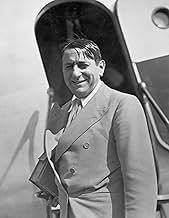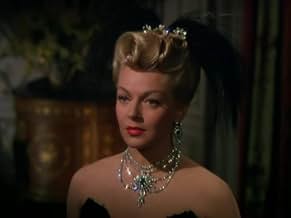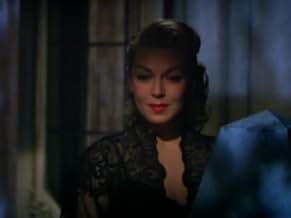IMDb RATING
5.7/10
702
YOUR RATING
Operating under royal orders, a count must woo a young and wealthy widow in order to save a kingdom from bankruptcy.Operating under royal orders, a count must woo a young and wealthy widow in order to save a kingdom from bankruptcy.Operating under royal orders, a count must woo a young and wealthy widow in order to save a kingdom from bankruptcy.
- Nominated for 2 Oscars
- 2 nominations total
Sujata Rubener
- Gypsy Girl
- (as Sujata)
Ludwig Stössel
- Major Domo
- (as Ludwig Stossel)
John Alban
- Club Patron
- (uncredited)
Erville Alderson
- Cart Driver
- (uncredited)
Bette Arlen
- Girl at Maxim's
- (uncredited)
Frank Arnold
- Waiter
- (uncredited)
Gertrude Astor
- Reception Guest
- (uncredited)
Featured reviews
Lana Turner is "The Merry Widow" who goes to Marchovia to see her deceased husband being honored by his homeland. In the meanwhile, she hears Fernando Lamas singing at a party at an inn, where he and the band were staying. They were supposed to greet her at the train's arrival. But, the train was late. What she doesn't know is that the country's king, played by Thomas Gomez, only asked her there, because they are in debt and need financial aid, badly. Or else, another country will invade and make their small country a province. Lamas is, of course, the prince and he is ordered to woo the rich widow. Una Merkel has a memorable role as her companion, and then there's a case of mistaken identity.
I do admit that it kind of feels its age with its obvious corniness. Some may say it is better than "Latin Lovers." But I can see their separate good points."Latin Lovers", I think, comes off better with its well-written dialogue and scenario. But, "The Merry Widow" is much more romantic and is very expressive with the grand score and dance numbers, which is its strength. Also, the good looks and chemistry between the stars help. They were a couple at this point in their careers, and they were very amorous. So I've read here.
All in all, if you want to see Lana and Fernando and love the waltz and the music of "The Merry Widow", then this is for you. I personally watch it every chance I get. After all, like people, if you love them, then you can forgive their flaws. "Say it again." (Inside joke.) After all, like people, if you love them, then you can forgive their flaws. Watch "The Merry Widow" and enjoy, flaws and all!
I do admit that it kind of feels its age with its obvious corniness. Some may say it is better than "Latin Lovers." But I can see their separate good points."Latin Lovers", I think, comes off better with its well-written dialogue and scenario. But, "The Merry Widow" is much more romantic and is very expressive with the grand score and dance numbers, which is its strength. Also, the good looks and chemistry between the stars help. They were a couple at this point in their careers, and they were very amorous. So I've read here.
All in all, if you want to see Lana and Fernando and love the waltz and the music of "The Merry Widow", then this is for you. I personally watch it every chance I get. After all, like people, if you love them, then you can forgive their flaws. "Say it again." (Inside joke.) After all, like people, if you love them, then you can forgive their flaws. Watch "The Merry Widow" and enjoy, flaws and all!
This 1952 version of "The Merry Widow" couldn't possibly compare to the 1934 Lubitsch production, but MGM went all out to make a lavish, colorful film starring Lana Turner and Fernando Lamas. To do so, all of the singing, except for one short section, was taken away from Turner. I guess someone thought a soprano voice coming out of her mouth would seem funny to 1952 audiences, which seems a strange decision. Some stars, like Ava Gardner, were dubbed constantly. Lamas did his own singing in a tremulous tenor. Considering the fact that "The Merry Widow" has been a staple of opera companies for years, it really needs some bigger guns. MGM had them but didn't use them.
"The Merry Widow" is about Crystal Radek (Turner), a wealthy widow living, in this version, in New York, whose husband was from a small country, Marshkovia. She is lured to Marshovia under false pretenses. The country is broke and Count Danilo (Lamas) has been asked to court and marry her so the debts can be paid. Danilo mistakes Crystal's attractive but older friend (Una Merkel) for Crystal and is reluctant to pursue her. Crystal finds out why she has been brought to Marshovia and takes off for Paris. Danilo follows her - still not knowing what she looks like - and she follows him to Maxim's and introduces herself as Fifi, a chorus girl. Danilo falls in love with Fifi, but his country has ordered him to marry Crystal.
This film was nominated for best art direction and best costumes, and no wonder. "The Merry Widow" is absolutely gorgeous, with the most heavenly costumes and sets. Turner looks fabulous and despite the long gowns, gets to show off her legs. Lamas makes a handsome and charming Danilo. As Billy Crystal would say, he looks mahvelous.
The supporting players - Thomas Gomez, Richard Haydn, Maurice Danilo, King Donovan, are all excellent, and if you think you recognize Gwen Verdon among the dancers at Maxim's, you do.
The best part of the film is the waltz toward the end of the film, which is stunning. Hitchcock aficionados will recognize "The Merry Widow Waltz" from "Shadow of a Doubt" and get an eerie feeling every time they hear it - which in "The Merry Widow" is more than once.
When Dore Schary took over MGM in 1951, he considered Lana Turner, at the age of 30, nothing more than an over-the-hill actress. She proved him wrong. Seeing her in "The Merry Widow" is a good indication that Dore Schary needed stronger glasses.
"The Merry Widow" is about Crystal Radek (Turner), a wealthy widow living, in this version, in New York, whose husband was from a small country, Marshkovia. She is lured to Marshovia under false pretenses. The country is broke and Count Danilo (Lamas) has been asked to court and marry her so the debts can be paid. Danilo mistakes Crystal's attractive but older friend (Una Merkel) for Crystal and is reluctant to pursue her. Crystal finds out why she has been brought to Marshovia and takes off for Paris. Danilo follows her - still not knowing what she looks like - and she follows him to Maxim's and introduces herself as Fifi, a chorus girl. Danilo falls in love with Fifi, but his country has ordered him to marry Crystal.
This film was nominated for best art direction and best costumes, and no wonder. "The Merry Widow" is absolutely gorgeous, with the most heavenly costumes and sets. Turner looks fabulous and despite the long gowns, gets to show off her legs. Lamas makes a handsome and charming Danilo. As Billy Crystal would say, he looks mahvelous.
The supporting players - Thomas Gomez, Richard Haydn, Maurice Danilo, King Donovan, are all excellent, and if you think you recognize Gwen Verdon among the dancers at Maxim's, you do.
The best part of the film is the waltz toward the end of the film, which is stunning. Hitchcock aficionados will recognize "The Merry Widow Waltz" from "Shadow of a Doubt" and get an eerie feeling every time they hear it - which in "The Merry Widow" is more than once.
When Dore Schary took over MGM in 1951, he considered Lana Turner, at the age of 30, nothing more than an over-the-hill actress. She proved him wrong. Seeing her in "The Merry Widow" is a good indication that Dore Schary needed stronger glasses.
The fictional nation of Marshovia is facing bankruptcy. So, to try to improve their finances, they invite a widow (Lana Turner) to their nation in order to give her deceased husband a statue...and try to marry her off to the handsome Count Danillo (Fernando Lamas). When she learns of the scheme, the widow is naturally angry and leaves Marshovia...and the Count soon follows her to Paris. Can the scheme STILL work in spite of all this?
The 1934 version of "The Merry Widow" was a marvelous old film for several important reasons. The Franz Lehár operetta (based on Henri Meilhac's play) was given the special Ernst Lubitsch touch and it happened to star one of the most charming actors of its day, Maurice Chevalier. But, when MGM wanted to remake the film in 1952, it lacked this same marvelous direction and starred the handsome but much blander Fernando Lamas. Apart from the nice Technicolor, it really is inferior to the earlier version...though it still is watchable and pleasant...but nothing more.
The 1934 version of "The Merry Widow" was a marvelous old film for several important reasons. The Franz Lehár operetta (based on Henri Meilhac's play) was given the special Ernst Lubitsch touch and it happened to star one of the most charming actors of its day, Maurice Chevalier. But, when MGM wanted to remake the film in 1952, it lacked this same marvelous direction and starred the handsome but much blander Fernando Lamas. Apart from the nice Technicolor, it really is inferior to the earlier version...though it still is watchable and pleasant...but nothing more.
The lovely Lana Turner stars in this rather lackluster Technicolor musical. In my opinion it is far inferior to the charming and hilarious 1934 Ernst Lubitsch version. (Both films are adaptations of an operetta, so the 1934 one isn't exactly the "original".)
To this film's credit, it's rather different from Lubitsch's version. It doesn't try to be an exact copy and can therefore be judged on its own merits. (I can't say which version of the story is most true to the original play.) This 1952 version is, for one thing, in color and features some new ballads to go with a couple familiar tunes from the earlier film. The songs, however, are largely forgettable. The storyline, about a small European kingdom sending a man to woo a wealthy widow, is a little different in this version, although the general arc is similar. (Viewers familiar with the 1934 version will notice the differences; I won't mention them here.)
This film overall did not impress me, partly because I'd been previously spoiled with the Lubitsch version, which is simultaneously a fairy tale romance and a hilarious comedy (with music, too!). This 1952 version is more of a second-tier MGM romance musical. It's really not a legitimate comedy, although it does try to be funny. But Lana Turner looks great in this good girl role (she'd played many a femme fatale) and the cast isn't bad. I can't fault the movie for trying, but it just falls a little flat for me.
THE MERRY WIDOW (1952) may be fun for musical junkies or viewers who don't know what they're missing, but I'd recommend the comedy of the 1934 version of the same story.
5.5/10
To this film's credit, it's rather different from Lubitsch's version. It doesn't try to be an exact copy and can therefore be judged on its own merits. (I can't say which version of the story is most true to the original play.) This 1952 version is, for one thing, in color and features some new ballads to go with a couple familiar tunes from the earlier film. The songs, however, are largely forgettable. The storyline, about a small European kingdom sending a man to woo a wealthy widow, is a little different in this version, although the general arc is similar. (Viewers familiar with the 1934 version will notice the differences; I won't mention them here.)
This film overall did not impress me, partly because I'd been previously spoiled with the Lubitsch version, which is simultaneously a fairy tale romance and a hilarious comedy (with music, too!). This 1952 version is more of a second-tier MGM romance musical. It's really not a legitimate comedy, although it does try to be funny. But Lana Turner looks great in this good girl role (she'd played many a femme fatale) and the cast isn't bad. I can't fault the movie for trying, but it just falls a little flat for me.
THE MERRY WIDOW (1952) may be fun for musical junkies or viewers who don't know what they're missing, but I'd recommend the comedy of the 1934 version of the same story.
5.5/10
My wife and I met doing a professional production of "The Merry Widow" in 1982 -- in English, but a straight translation.
Only the very basic skeleton of the original plot is visible in this "adaptation". Most of the characters have been deleted, along with the entire B plot, and all but one of the characters remaining have been renamed. Most of the characters in the movie aren't in the operetta, either. The action has been moved from Paris to, at first, Washington, DC, and then to the fictional country of Pontevedro, which the movie has renamed "Marshovia", and only later to Paris. The net result is that we don't reach the beginning of the original play until about 45 minutes in.
And the main source of tension in the plot is deleted, too. In the original, years before, Count Danilo and the heroine were very much in love, but his family refused to allow them to marry because she was poor; it's his broken heart that has rendered him a careless playboy. Now that, as a widow, she's the richest woman in the world, she still loves him, and he still loves her, but his pride won't let him admit it to anyone, even himself, and she must spend three acts playing mind games to break him down. The trope of the aristocrat with money problems who won't admit that he's in love with a rich woman for fear of what people will think supplied the main plots of a substantial fraction of Viennese operettas for decades after the 1906 "Widow". In this movie, they've never met before, which rips out not only the heart of the whole thing, but nearly all the comedy.
Lamas does a pretty decent job, though.
An interesting musical point is that several times we hear a snippet or so of "Trés Parisien", an extra song written (in English, despite the title) for the London première, which was not, as far as I know, usually found in American productions until the 1980s or so.
Only the very basic skeleton of the original plot is visible in this "adaptation". Most of the characters have been deleted, along with the entire B plot, and all but one of the characters remaining have been renamed. Most of the characters in the movie aren't in the operetta, either. The action has been moved from Paris to, at first, Washington, DC, and then to the fictional country of Pontevedro, which the movie has renamed "Marshovia", and only later to Paris. The net result is that we don't reach the beginning of the original play until about 45 minutes in.
And the main source of tension in the plot is deleted, too. In the original, years before, Count Danilo and the heroine were very much in love, but his family refused to allow them to marry because she was poor; it's his broken heart that has rendered him a careless playboy. Now that, as a widow, she's the richest woman in the world, she still loves him, and he still loves her, but his pride won't let him admit it to anyone, even himself, and she must spend three acts playing mind games to break him down. The trope of the aristocrat with money problems who won't admit that he's in love with a rich woman for fear of what people will think supplied the main plots of a substantial fraction of Viennese operettas for decades after the 1906 "Widow". In this movie, they've never met before, which rips out not only the heart of the whole thing, but nearly all the comedy.
Lamas does a pretty decent job, though.
An interesting musical point is that several times we hear a snippet or so of "Trés Parisien", an extra song written (in English, despite the title) for the London première, which was not, as far as I know, usually found in American productions until the 1980s or so.
Did you know
- TriviaAfter Lana Turner's millionaire husband Bob Topping left her in 1951, she slashed her wrist and had to wear a bracelet during this shoot to cover the scar.
- GoofsThe statement about beginnings of decades and centuries, is absolutely not correct. :-)
- Quotes
King of Marshovia: I'm not asking you to fall in love with the woman. Marriage is quite enough.
- ConnectionsFeatured in Hollywood... Hollywood ! (1976)
- SoundtracksGirls, Girls, Girls
(uncredited)
Music by Franz Lehár
Lyrics by Paul Francis Webster
Sung by Fernando Lamas
- How long is The Merry Widow?Powered by Alexa
Details
Box office
- Gross US & Canada
- $4,865,760
- Gross worldwide
- $9,810,000
- Runtime
- 1h 45m(105 min)
- Aspect ratio
- 1.37 : 1
Contribute to this page
Suggest an edit or add missing content























